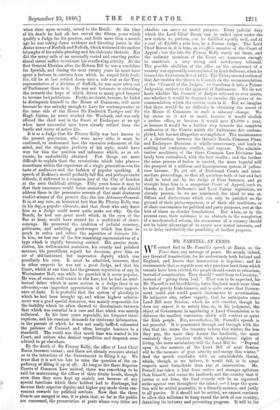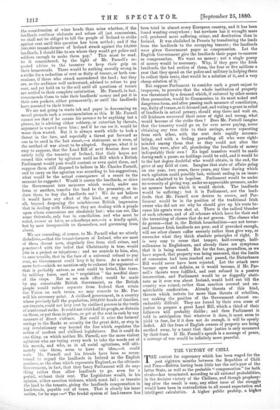MR. PARNELL AT ENNIS.
WE cannot find in Mr. Parnell's speech at Ennis, as the Times does, any message of peace. He avoids, indeed, any threat of insurrection, for he understands both Ireland and England, and knows that insurrection is hopeless ; and he recommends that as regards men who purchase land from which tenants have been evicted, the people should resort to ostracism, instead of assassination. They should " send them to Coventry," instead of "giving them lead." That was to be expected, for Mr. Parnell is not bloodthirsty, hates England much more than he hates greedy Irish farmers, and is quite aware that Govern- ment could and would punish incitements to assassination. He intimates also, rather vaguely, that he anticipates some Land Bill next Session, which he will consider, though he does not expect it to satisfy him, as, in his judgment, the object of Government in appointing a Land Commission is to discover the smallest concession which will content or quiet the Irish people. But, nevertheless, Mr. Parnell's speech is not peaceful. It is penetrated through and through with the idea that the worse the tenantry behave this winter, the less they pay, the more they harass the landlords, the more resolutely they interfere with their neighbours' rights of hiring, the more satisfactory will the Land Bill be. "Depend upon it, the measure of the Land Bill of next Session will be the measure of your activity and energy this winter." And the speech concludes with an unmistakable threat, which, though, as we believe, it would fail, is in some respects more formidable than one of insurrection. Mr. Parnell has taken a hint from earlier and stronger agitators than himself, and warns the landlords and the country that if justice is not done, the final remedy will be an organised strike against rent throughout the island :—" I hope the ques- tion will be settled peaceably, in a friendly manner, and justly to all parties. If it should not be settled, we cannot continue to allow this millstone to hang round the neck of our country, throttling its industry and preventing progress. It will be for
the consideration of wiser heads than mine whether, if the landlords continue obdurate and refuse all just concessions, we shall not be obliged to tell the people of Ireland to strike against rent until this question has been settled ; and if the 500,0(H) tenant-farmers of Ireland struck against the 10,000 landlords, I should like to see where they would get police and soldiers enough to make them pay." This must be read, be it remembered, by the light of Mr. Parnell's re- peated advice to the tenantry to keep their grip on their homesteads. There would be nothing morally wrong in a strike for a reduction of rent or fixity of tenure, or both con- cessions, if those who struck surrendered the land ; but they are. as the audience well understood, advised to refuse to pay rent, and yet hold on to the soil until all questions of tenure are settled to their complete satisfaction. Mr. Parnell, in fact, recommends them to take their landlords' money and put it in their own pockets, either permanently, or until the landlords have assented to their terms.
We are not going to waste ink and paper in denouncing on moral grounds such a recommendation as this. If Mr. Parnell cannot see that if he means his menace to be anything but a phrase, he is advising either robbery, or extortion by threats, argument is wasted upon him ; and if he can see it, would be worse than wasted. But it is always worth while to look a threat in the face, and especially a threat put forward as one to be used in the last resort,—a statement, as it were, of the method of war about to be adopted. Suppose, what it is easy to suppose, that the Land Bill of next Session does not satisfy fully the tenantry of Ireland, that their hopes are roused this winter by agitators until no Bill which a British Parliament would pass would content or even quiet them, and suppose them still disposed to believe in Mr. Charles Parnell, and to carry on the agrarian war according to his suggestions, what would be the actual consequence of a resort to the measure he suggests Would it coerce the landlords, or drive the Government into measures which would, under one form or another, transfer the land to the peasantry, or in- duce them to buy the landlords out ? We do not believe it would have any effect of the kind, or any effect at all, beyond deepening the mischievous British impression that in dealing with Irishmen they are dealing with a people upon whom concessions are absolutely lost ; who can see, like some Orientals, only fear in conciliation, and who must be ruled, sooner or later, as schoolboys are,—in a kindly spirit, but by men irresponsible to themselves, and governing from above.
We are conceding, of course, to Mr. Parnell what we utterly disbelieve,—that the tenant-farmers of Ireland, who are most of them decent men, singularly free from civil crime, and penetrated with the belief that Christianity is true, would join in a project so iniquitous ; and we concede to him, also, to save trouble, that in the face of a universal refusal to pay rent, no Government could levy it by force. As a matter of mere fact—which we mention only to exhaust the argument— that is probably untrue, as rent could be levied, like taxes, by militirry force, used to " requisition " the needful share of the crops. But as no such effort would be made by any conceivable British Government, as the British people would rather separate from Ireland than retain the Union on such terms, we may concede to . Mr. Par- nell his necessary point. A civilised government, in a country where precisely half the population, 500,000 heads of families, are tenants, could not levy rent by civilised process in the teeth of a universal strike. It could not evict half its people, or distrain on them, or put them in prison, or get at the rent in cash by any measure of direct violence. Nor could it seize the farmers' savings in the Banks as security for the great debt, or step in any revolutionary way beyond the line which regulates the action of modern and civilised legislatures. But it could do one thing, on which neither Mr. Parnell, nor the more violent agitators who are trying every week to take the words out of his mouth, and who, as in all social agitations, will ulti- mately take them, seem to have an idea,—it could wait. Mr. Parnell and his friends have been so accus- tomed to regard the landlords in Ireland as the English garrison, as the class which represents England, as the ultimate Government, in fact, that they fancy Parliament will do any- thing rather than allow landlords to go, even for a period, without their rent. The Legislature would, in his opinion, either sanction violence, which must fail ; or transfer the land to the tenants, giving the landlords compensation in land-bonds, payable out of taxes. That is clearly his inner notion, for he says :—" The feudal system of land-tenure has
been tried in almost every European country, and it has been found wanting everywhere ; but nowhere has it wrought more evil, produced more suffering, crime, and destitution than in Ireland. It was abolished in Prussia by transferring the lands from the landlords to the occupying tenants ; the landlords were given Government paper as compensation. Let the English Government give the landlords their paper to-morrow as compensation. We want no money ; not a single penny
of money would be necessary. Why, if they gave the Irish landlords, the bad section of them, the four or five millions a year that they spend on the police and military in helping them to collect their rents, that would be a solution of it, and a very cheap solution of it."
But suppose Parliament to consider such a grant unjust to taxpayers, to perceive that the whole institution of property was threatened by a demand which, if enforced by other means than persuasion, would be Communism in its most naked and dangerous form, and after passing such measure of conciliation, say, fixity of tenure, as it deemed just, and voting a grant in relief of landlords in actual penury, should stop there and wait on, till Irishmen recovered their sense of right and wrong, what would become of the strike then ? Does Mr. Parnell imagine that the tenantry would go on for ever never paying, never obtaining any true title to their savings, never separating
from each other, with the rent debt rapidly accumu- lating, and with a feeling pervading all who were right- minded among them that as they could not alter the law, they were, after all, plundering the landlords of money indisputably their own ? No legal transfers would be made during such a pause, no holdings could be sold, and it would be to the last degree doubtful who would obtain, in the end, the price of any field of corn. Imagine that state of affairs going on one year, two years, three years, any time during which such agitation could possibly last, without ending in an insur- rection admitted to be hopeless. Parliament would be under no necessity of giving way, under no appreciable pressure, under no menace before which it would shrink. The landlords would be suffering ; but it is Parliament, not the land- lords, that Mr. Parnell now desires to coerce, and Par- liament would be in the position of the traditional Irish owner who did not see why he should give up his rents be- cause his agents were shot at. There is the radical blunder of such schemes, and of all schemes which have for their end the terrorising of classes that do not govern. The classes who do govern—that is, the British householders—are not terror- ised because Irish landlords are poor, and if provoked enough, will see other classes suffer serenely rather than give way, or surrender what they think absolute principles of right. It is very easy to rouse that temper, half-courage, half- sullenness in Englishmen, and already there are symptoms that it is being roused. But for the fear, groundless, as we have argued, that property was being menaced, that the limits of concession had been reached and passed, the Disturbance Bill would never have been rejected. Let the attack once become open and definite, as it would become, if Mr. Par- nell's threats were fulfilled, and rent refused in a passive insurrection, and Parliament would be as doggedly obsti- nate as it ever was about Ireland, would hold out till the country was ruined, rather than sanction avowed and un- mistakable confiscation. Already threats of this kind, threats which irritate far more than threats of rebellion, are making the position of the Government almost un- endurably difficult. They are forced by their own sense of justice to prepare a great Land Bill, which a third of their followers will probably dislike ; and then Parliament is told in anticipation that whatever it does, it must seem to yield to fear, for if it does not do enough, it will be openly defied. All the fears of English owners of property are being soothed away, by a taunt that their justice is only measured by their fears. If Mr. Parnell's speech is a message of peace, a message of war would be infinitely more peaceful.



































 Previous page
Previous page